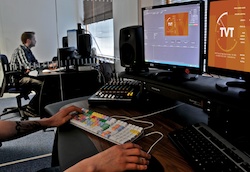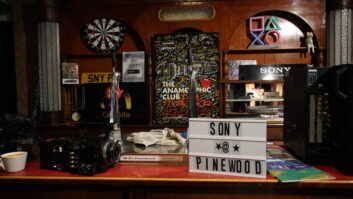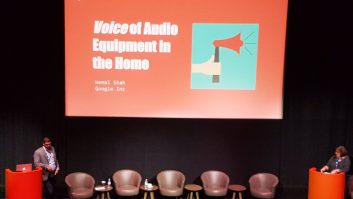
Melanie Dayasena-Lowe takes a tour of TVT’s file-based operations in West London and finds out how AmberFin’s nascent Unified Quality Control functionality is helping to deliver new efficiencies for the content mass delivery ‘media factory’
London-based broadcast facility TVT has been working with AmberFin on the ongoing development and beta testing of the company’s new Unified Quality Control (UQC) solution that has been integrated within TVT’s file-based workflow.
As a user of AmberFin’s iCR file-based content ingest and transcoding system for many years, the relationship first began when TVT approached AmberFin at a trade show looking for a hyper efficient workflow. Bruce Devlin, chief technology officer at AmberFin, explains: “[TVT was] looking for ingest and quality control tools to help bring large volumes of tape in, turn them into files and then feed them into a very efficient file-based workflow. We explained how our ingest system worked and how it could be automated. That led them to put together a facility with iCR as the ingest engine to bring content into the facility.”
When TVT took the decision to go file-based, it opted for AmberFin as the best solution. The broadcast facility deals with a large volume of content so it was looking for a solution that could cope with this demand. “We’re currently still one of the only companies doing mass delivery of complete channels in long form media file delivery to various broadcasters. We’re the only third party company that deals with it in the bulk of material we do,” explains Jake Robbins, chief operations officer for TVT.
Media factory
At one of its two Chiswick offices, TVT runs BBC Worldwide’s global channel media supplies with about 55 staff. The broadcaster’s aggressive expansion plan meant its channels grew from six in 2008 to 23 now. TVT’s Managing Director Kim Thesiger describes his company as a “media factory” that needs to work as efficiently as possible. “If there is a bottleneck the process grinds to a halt; it has to work efficiently and smoothly.”
At the BBC Worldwide facility alone, TVT takes in up to 9,000 hours of material a year. With TVT creating up to three versions of each show (pre-watershed, post-watershed and a version edited for more sensitive territories), this could amount to 27,000 hours of master material a year. These masters could be delivered in multiple formats for playout or VOD potentially increasing this figure threefold.
The second TVT site in Chiswick is one year old and operates UKTV’s compliance contract, with about 30 staff servicing UKTV’s ten channels and nine +1 channels.
Robbins explains that when it came to selecting the AmberFin solution it was “a no brainer. [AmberFin was] also prepared to work very closely with us because no-one had really used it in the way we were planning to use it and often because we’re doing things on a global delivery scale there were things we’d come up with that you can’t test with. For example, formats of tapes come from the BBC that no-one really uses anymore. For AmberFin it was an interesting test bed.”
“One of our unique selling points is that we have the ability to develop ourselves. If iCR didn’t exist we would have developed something similar,” Thesiger reveals. According to Devlin, it’s all about trust and confidence: “iCR is just a spanner that helps you deliver better files, faster and to have more confidence in the files that you’re delivering.”
Dealing with the large volume of material it receives, TVT uses Flexicarts for automated ingest for an efficient operation. “It means I can have the operation running when no-one’s here,” says Robbins. It has its own in-house expertise of building software so one of its consultants was able to build TVT an interface with AmberFin’s APIs to run automatically. “The way we’ve built it I can load up the Flexicart, AmberFin will ingest it regardless of what it is and it just works. The Flexi control enables us to capture everything. AmberFin has taken our interface and integrated it with the system, which gives us an additional buy-in to the services.”
The whole process is speeded up through automated ingest and QC, says Robbins. “I can get people QC-ing one hour HD programmes in 5-10 minutes. Without it I’d need to employ more staff and technically have longer days. It has enabled us to have a very slick workflow.”
Quality checks
The latest development from AmberFin is UQC, which offers what it claimes is a unique approach to quality control combining multiple tools for baseband checks during tape ingest, file-based QC after ingest, and overall operator-controlled QC — including annotation and mark-up. TVT’s Thesiger believes that UQC delivers the promise of significant new efficiencies for facilities like his.
“Like all companies, we are starting to receive a significant percentage of master material as files rather than tapes, so having a reliable file QC solution is extremely important. Having a unified interface for tape and file QC is also important from a training perspective. Finally, we’re also planning to use AmberFin UQC to auto-QC outgoing Playout and VoD files to ensure that transcoding glitches and file copy errors are caught before the file reaches the client.”
The UQC solution can help operators to flag up any potential inconsistencies. Devlin explains: “We realised that when you build a QC system you’re always going to have false positives and negatives. Humans suffer from distraction and lapses in concentration while machines don’t know the difference between pictures suddenly going black and white because of a technical element or because it’s a dream sequence/something creative. Our QC tool is aimed at allowing a human to add judgement to those automated measures. The human is trying to validate whether or not that event created by the automated tool was a real event, error or just an artefact of the programme.”
A key element of UQC, says Devlin, is that information can be captured at the front end and if you redo a QC downstream you can compare the results of the downstream QC against the upstream QC. “They should be the same if all you’re doing is a simple transcode. The key business gain from UQC is the fact that by doing this A-B comparison around a process, what you’re starting to look at is the QC of the process as well as the QC of the files.”
Test evolution
The beta testing at TVT has been ongoing for several months and will continue. However, UQC is commercially available with customers already committed. In addition to the testing at TVT, AmberFin has been carrying out its own stress testing in its labs. At the user end, Robbins explains: “The product never stops, it’s always growing, changing and evolving. You can’t expect to evolve that without breaking some of the things that you did previously if you aren’t able to run it in a live production environment. You can make it work everytime in the lab. It’s not beta testing of the initial product, it’s the evolving testing.”
As the product continues to develop with the support of TVT, the broadcast facility has its own ambitious growth plans with a new client office opening up in Singapore. The new Asia hub for BBC Worldwide will be based on the successful model operating at TVT’s Chiswick location for the TV channel. “It will be a file-based facility. We will be developing more software to automate other parts of the workflow and automate media management by developing a whole suite of media management applications,” says Thesiger.






